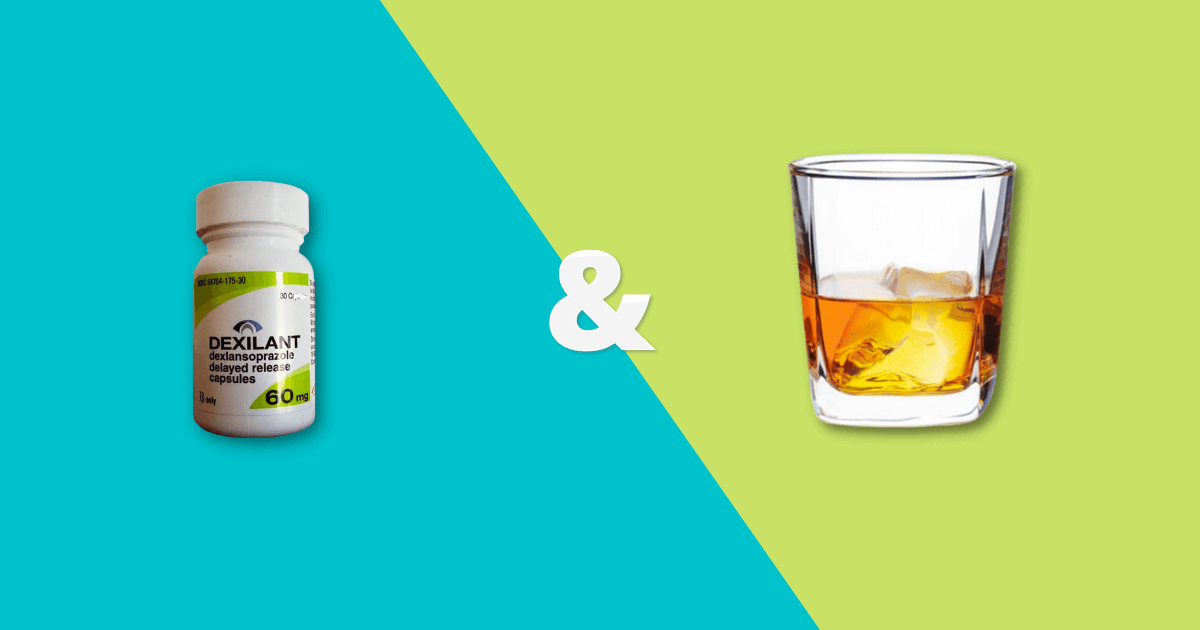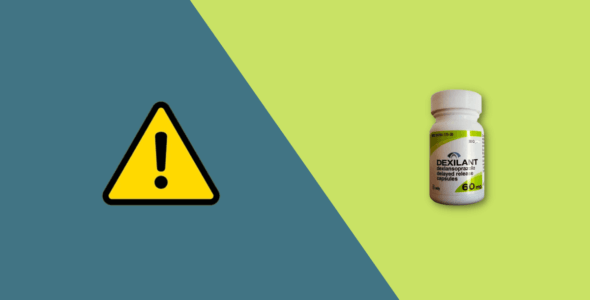Dexilant and alcohol: can they be mixed together?
Key highlights
- There are no interactions between the use of Dexilant and alcohol. However, drinking alcohol may trigger acid reflux or worsen your symptoms.
- After ingestion, alcohol will irritate the lining of your stomach and cause inflammation.
- Long-term inflammation can cause cell death and permanent damage to your stomach and esophagus, which can cause an increased risk of gastritis or ulcers.
- If you suffer from GERD, you should avoid drinking alcohol.
Table of contents
- What is Dexilant (dexlansoprazole) used for?
- Can I drink alcohol while taking Dexilant?
- What should you tell your doctor before starting Dexilant?
- What are the side effects of Dexilant?
- What does Dexilant interact with?
- Can you drink coffee while taking Dexilant?
- How long does it take Dexilant to work?
- Do you need to take Dexilant with food or without?
- Dexilant vs Prilosec (omeprazole)
Alcohol can cause drug interactions when taken along with certain medications. Drinking alcohol can also worsen the condition you are treating.
Dexilant is a brand-name medication that decreases stomach acid in patients with GERD. The use of alcohol with Dexilant is generally not recommended.
Drinking alcohol may increase the amount of acid your stomach produces, which can worsen the symptoms of GERD. If you drink alcohol, talk to your healthcare professional about the amount that’s safe for you to have while you’re taking Dexilant.
Read on to find out about how Dexilant works and what can happen if you mix it with alcohol.
What is Dexilant (dexlansoprazole) used for?
Dexilant is a prescription medication that is manufactured by Takeda Pharmaceuticals. It is FDA-approved to:
- Heal acid-related damage to the lining of your esophagus (erosive esophagitis)
- Manage healed erosive esophagus and the relief of heartburn
- Treat gastroesophageal reflux disease (GERD)
The active ingredient in Dexialnt is dexlansoprazole. It is the R-enantiomer of Prevacid (lansoprazole). Dexilant is classified as a proton pump inhibitor (PPI) and is used in adults and pediatric patients 12 years of age and older. It works by attaching to proteins in the cells of your stomach called H+/K+-ATPases that increase acid secretion. By attaching to these proteins, PPIs block them from working. This leads to a decreased amount of acid in your stomach, which can help prevent acid reflux and damage to your esophagus.
Dexilant is a delayed-release capsule that is typically taken once a day with or without food. Dexilant capsules should be swallowed whole. Its active ingredient is released in two phases at different pH values and with a time interval. This helps it inhibit acid secretion for a longer period when compared to other PPIs.
If you have trouble swallowing Dexilant capsules, you can open the capsule and sprinkle the intact granules on a tablespoonful of applesauce. You should then swallow the mixture immediately without chewing. Do not save the mixture to be taken at a later time.
If you miss a dose of Dexilant, take it as soon as you remember. If it is almost time for the next scheduled, skip the missed dose and take the next dose at its regular time. Do not take extra doses of Dexilant to make up for a missed dose.
RELATED: What is Dexilant
Can I drink alcohol while taking Dexilant?
There are no interactions between the use of Dexilant and alcohol. However, drinking alcohol may trigger acid reflux or worsen your symptoms. It is not known exactly how alcohol can cause or worsen GERD symptoms but it is thought it can:
- Irritate and cause inflammation of your stomach
- Cause your lower esophageal sphincter not to work properly
- Cause increased urination
After ingestion, alcohol will irritate the lining of your stomach and cause inflammation. Long-term inflammation can cause cell death and permanent damage to your stomach and esophagus. This can cause an increased risk of gastritis or ulcers.
Drinking alcohol can also impair the muscle located at the junction of your esophagus and stomach called the lower esophageal sphincter (LES). By blocking its ability to close, it can allow stomach acid to flow back up into your esophagus, causing irritation and damage.
Alcohol is a diuretic, which makes you urinate more often. Increased urination can lead to dehydration, which can worsen symptoms of GERD.
While alcohol is thought to contribute to symptoms of GERD, it will affect people differently. If you already suffer from GERD, you should avoid drinking alcohol. Chronic alcohol consumption can lead to long-term complications, regardless if you have GERD or not. Contact your doctor for medical advice about the risks of drinking alcohol with your current medications and medical conditions.
What should you tell your doctor before starting Dexilant?
Before starting this medication, make sure your doctor is aware of your medical conditions, including:
- Low magnesium, calcium, potassium, or sodium levels
- Liver problems
- Are taking a diuretic
- Osteoporosis
- Are pregnant, plan on becoming pregnant because based on animal data, Dexilant may cause adverse effects on bone growth and development of your unborn baby
- Are breastfeeding as it is not known if Dexilant is found in breast milk
What are the side effects of Dexilant?
The most common side effects of Dexilant seen in clinical trials include:
- Diarrhea
- Stomach pain
- Nausea
- Upper respiratory tract infection
- Vomiting
- Gas
- Headache
- Constipation
- Common cold symptoms
- Weight gain
Dexilant can sometimes cause serious side effects such as:
- Serious allergic reactions
- Low vitamin B12 levels
- Low magnesium levels (hypomagnesemia)
- Stomach growths (polyps)
- Increased risk of Clostridium difficile-associated diarrhea
- Increased risk of bone fracture
- Cutaneous and systemic lupus erythematosus (rash on the cheeks or other body parts, change in skin color, increased sensitivity to the sun, muscle or joint pain
- Arrhythmia, bradycardia, or chest pain
Speak with your healthcare provider about the possible drug interactions with any other prescription drugs, over-the-counter products, vitamins, and supplements you are taking. These are not all of the possible side effects of Dexilant. You should always seek medical advice for drug information or any questions about your medical condition or treatment. You can report side effects to FDA at 1-800-FDA-1088 or www.fda.gov/medwatch.
RELATED: Dexilant side effects and how to avoid them
Does Dexilant cause weight gain?
Weight gain is not a common side effect of Dexilant, but it has been reported. It is more common in people who take it for a year or longer. It is not known why Dexilant may cause this interaction. You can offset any weight gain from Dexilant by making some lifestyle changes. Eating a healthy diet while getting regular exercise is the most effective way to maintain a healthy body weight while on Dexilant. Talk with your doctor about a diet and exercise plan that is right for you.
What does Dexilant interact with?
When taken with other medications, Dexilant can change how they work or increase the frequency and severity of side effects. You should ask your doctor if any of the prescription drugs, over-the-counter medications, vitamins, and herbal supplements you take may interact with this medication such as:
- Antiretrovirals such as atazanavir, rilpivirine, or nelfinavir
- Warfarin
- Methotrexate
- Digoxin
- Tacrolimus
- Ketoconazole
- Itraconazole
- St. John’s wort
- Rifampin
- Voriconazole
Can you drink coffee while taking Dexilant?
Caffeine, which is a major component of coffee, can be a possible trigger for heartburn in some people. It may trigger or worsen GERD symptoms because it can relax the lower esophageal sphincter. However, there are no well-designed studies that show the elimination of coffee or caffeine will improve your GERD symptoms or reduce complications. Most guidelines on managing GERD symptoms do not recommend eliminating caffeine from your diet.
How long does it take Dexilant to work?
Dexilant will start stopping acid production within a few hours of taking it. According to the package insert, clinical studies saw that 38% of patients taking Dexilant were heartburn-free after 3 days. However, as with all medications, your results can vary. Do not stop taking this medication if you do not see an improvement in symptoms. It may take up to 2 weeks before you see relief in your GERD symptoms. Contact your doctor if you have not seen symptom improvement after 2 weeks of Dexilant treatment.
Do you need to take Dexilant with food or without?
Dexilant can be taken with or without food. Dexilant capsules should be swallowed whole. If you cannot swallow the capsule whole, you can open it and pour its contents into a tablespoon of applesauce. You should then swallow the mixture without chewing. Do not save the mixture for future use.
Dexilant vs Prilosec (omeprazole)
Prilosec (omeprazole) and Dexilant (dexlansoprazole) are both PPIs used to treat erosive esophagitis, gastroesophageal reflux disease (GERD), and heartburn. They use the same mechanism of action way to reduce your production of stomach acid. It typically takes omeprazole around 30 minutes to work while it takes Dexilant 1 to 2 hours. While they have not been directly compared, they are both effective at reducing the production of stomach acid. Because Dexilant is released at two different points in your digestive tract and several hours apart, Dexilant may block acid production for a longer period than omeprazole.
Dexilant can be taken with or without food. Omeprazole needs to be taken on an empty stomach, as food can significantly decrease your body’s absorption of this medication. Dexilant typically causes fewer stomach problems, such as diarrhea.
There is a cost difference between omeprazole and Dexilant. Omeprazole will cost around $65 for #30, 20mg capsules. For#30 of generic Dexilant 60mg capsules, it will cost around $225. However, you can save on brand-name drugs like Dexilant through NiceRx if eligible for assistance.
Medically reviewed
A medical professional has reviewed this article.


Jamie Winn, PharmD
Jamie Winn, PharmD
Dr. Jamie Winn received his Doctor of Pharmacy in 2002 from the University of South Carolina College of Pharmacy, Columbia, SC. Jamie is a medical reviewer for NiceRx.


